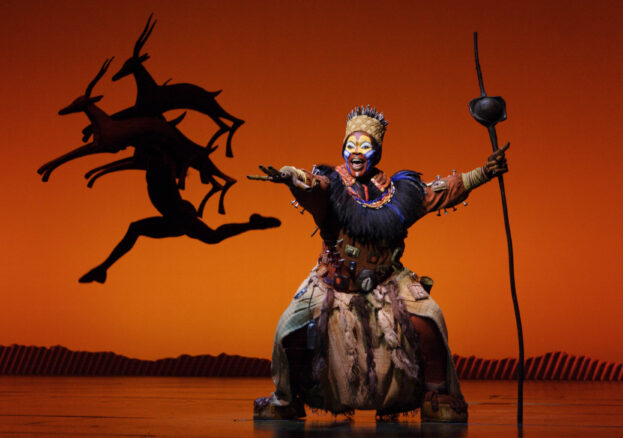
In celebration of Black History Month, Disney Theatrical are spotlighting some of The Lion King’s incredibly talented team who work on and off stage. We took a deep dive into their journey into the arts, and discussed why representation matters and how we can pave the way for up and coming talent. In roles that span one to 24 years, everyone had their own unique take on how The Lion King positively impacts Black culture.
The Black History Month theme this year is Reclaiming Narratives and focuses on sharing stories of Black history and culture. One of the longest running musicals featuring a diverse cast, with an impressive 25-year history, The Lion King was one of the first productions to do this.
Director and designer Julie Taymor’s vision is an authentic one and pays homage to sharing stories of Black culture, says The Lion King’s Company Manager Patience Persson: “From music, to costume and reverting back to African masks, there’s so much detail that has gone into everything to celebrate Africa, and the languages that are spoken in the show are beautiful.”
Merryl Ansah, who plays Nala, recalls that The Lion King was one of the first shows she saw as a child: “The show sheds a spotlight on the cultural importance of telling stories based in African culture; it draws inspiration from the Serengeti, and of course the songs are steeped in South Africa.”
Twenty-four years ago, Seon Blackman joined as a Stage Technician and for the ‘behind the scenes’ veteran, it’s about how audiences connect with the show: “What’s made The Lion King so special over the last 25 years is that it’s about all the different characters that are part of the human archetype, and that’s what I think people really relate to.”
For the next generation of theatre professionals, you might think it’s all glitz and glamour being part of a successful West End show. There’s an element of that, but doing eight shows a week is demanding – physically, mentally and emotionally. Whether you’re on or off stage, you need to be committed, resilient and have stamina. Having worked as a dancer in The Lion King before becoming Company Manager, Persson knows what that means: “People who don’t work in theatre don’t understand the demands and the level of commitment it takes to deliver the same performance every day.”
For South African dancer Lwando Dutyulwa, who made his West End debut as part of the Ensemble last year, being in The Lion King has been a time of growth: “I wasn’t confident until I came here. I’m only now realising the power of my voice and acting skills.
This is the importance of The Lion King. You get to realise more of yourself. The show is not always the same and if you’re tired, it’s a challenge but you stay strong and build your energy.”
It’s the same for being part of the technical team. Although we’ve come a long way from when Seon Blackman used to manually fly performers across the stage, you still have to be physically fit. But having been a part of the production for over two decades, he still loves the show: “I love the vibe, I have a family of people who I can relate to people from all over the world.”
Representation within the arts will always be a hot topic, particularly during Black History Month. Blackman explains: “It’s important to see yourself on stage SO that you know you can do those things as well. It’s good to go into a place and see people who look like you doing the job you’re doing.” Dutyulwa agrees that being in The Lion King is an opportunity to inspire the next generation: “I didn’t know anyone back in South Africa who did what I do now, and knowing there might be a child sitting in the audience watching this show wanting to be a singer, actor, dancer whether it’s a Black woman, a Black man, or a Black kid up there doing this – it brings a shift and lets the younger generation know anything is possible.”
Looking to the future of theatre, what’s on the horizon for the younger generation? Persson remembers that when learning ballet as a child, there wasn’t much diversity: “Slowly, more young people are filtering through into these roles. But, young people are not being told that the skills they are learning now are applicable in theatre, too. If you love drawing, then you could go into set design. You like being organised? You could be a company manager.”
Ansah feels positive about this, too: “Each step we’re making is contributing towards a better and more inclusive space.”
Finally, Dutyulwa encourages you to be fearless: “Don’t let fear be part of your journey. Do the work and the rest will fall into place.”
